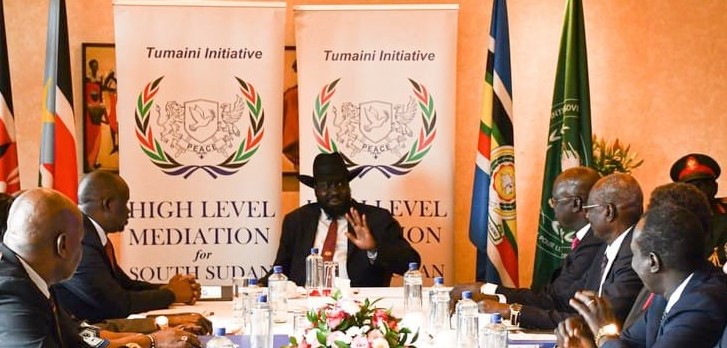Civil society activist and a delegate to the Tumaini Initiative talks on South Sudan in Nairobi, Edmund Yakani, talked to Radio Tamazuj on Wednesday after a meeting with President Salva Kiir in the Kenyan capital.
Below are edited excerpts:
Q. Mr. Yakani, what transpired in the meeting between President Salva Kiir and civil society members on the Nairobi peace talks?
A. As you are aware, President Salva Kiir was in Nairobi as part of the endorsement of Mr Raila Odinga as a candidate for the Chairperson of the African Union Commission.
We had early asked the President to meet us as the delegates at the Tumaini talks. He met with the government delegates, followed by those of the opposition and the civil society or the stakeholders. This meeting was very fruitful and all the delegates were able to tell the President that we have considered the concerns of the SPLM-IO and made some adjustments.
The second thing we discussed was the President’s stance on the recent controversial security Bill passed by parliament. We demanded a clear explanation on this Bill after it was sent to his office. In addition, according to the parliament spokesperson, it is now a law.
Thirdly, we assured the President that the Tumaini is the only way for extending the transitional period. Therefore, it should be clear to all the political leaders that Tumaini is not replacing the Revitalized Peace Agreement. We also asked him that on his return to Juba, he should explain this message to his first vice-president so that he can allow his delegation to resume the Tumaini talks.
Q. Were all the delegates able to meet President Kiir in person?
A. Yes. He first met with the government delegation, followed by the opposition groups and then the stakeholders.
Q. So what you have just explained is the outcome of these meetings, right?
A. Yes, these are key messages. We asked him to go and brief his Vice-President Riek Machar that we have made the changes on the protocols that were signed a few months ago.
The second thing is that we wanted to know whether the recent security Bill was now a law or not. The third thing, we asked him to convince Machar to send the SPLM-IO delegates back to Tumaini because we want to finish before September 22. Why are we saying September 22? This is based on the electoral law and this is the date the government should be dissolved.
This is the same law that was used to determine the December 22 election date. Therefore, it is the same law that stipulates that on September 22, the entire government should be dissolved. If we are unable to finish before September 22, there will be an issue with the legitimacy of the government.
Before that date, we need to have a dialogue among all the political parties that should decide on the extension of the transitional period. We want to ensure that by September 22, there should be a new government in place based on the result of the inter-parties’ dialogue. Therefore, based on the R-ARSS, there is a challenge to the political legitimacy of the government in South Sudan.
If the delegates are unable to reach an agreement before September 22, the legitimacy of the government will be questionable. In addition, if there are no elections on December 22, there will be a constitutional crisis in the country.
That is why we tell the President that Tumaini must end before September 22.
Q. What was the reaction of the President?
A. He said he heard our message and he would take the responsibility to discuss with the signatories to the peace agreement in Juba. He would meet with them and communicate his official answers.
Q. We heard that you are planning to meet the first vice-president. When do we expect that to happen?
A. I am planning to meet the first vice-president so that I can convey the message from the Tumaini. I want to tell him that the position that he presented about Tumaini has been considered and we want him to allow the IO delegate to return and we would also like to know his position on the security law.
I will also discuss with him the challenges about the political legitimacy by September 22 and the constitutional crises by December 22. We are well aware that Machar has no interest in an election in December because we are unable to fulfil all the pre-condition within this time.
We need another legitimate political platform such as the Tumaini that will give a legitimate political extension as it happened with the road map. We need something that has a political consensus, funding, trust building. In addition, in case we fail to achieve a political transformation within this period, we should have only a transitional government. We do not want to see an extension of another 24 months and end without any positive result.




